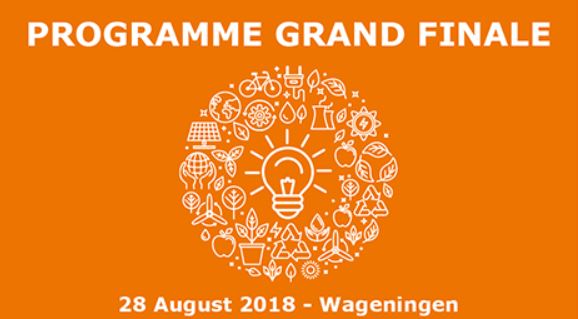Symposium: Urban Greenhouses and the Future of Food
Competition Grand Finale: Design the Ultimate Green House
On August 28, 2018, Institute Research Director Nevin Cohen gave the keynote talk at an international student urban agriculture design competition sponsored by Wageningen University in The Netherlands. Fourteen teams of students from six countries competed to propose solutions to integrate urban food production into Amsterdam’s former Bijlmer Prison, which has been decommissioned and is slated to be reused for housing and commercial development.
Dr. Cohen’s talk emphasized the need for urban planners promoting urban agriculture to address four key challenges:
(1) Ensuring that urban agriculture creates new pathways for economic development by serving as a training ground for young people, as does Farms at NYCHA, a program that engages youth from public housing in managing large-scale urban farms at six housing developments in New York City;
(2) Integrating agriculture as a tool for urban resilience, as the Gardens Rising project accomplishes by transforming the nearly 40 community gardens in NYC’s Lower East Side into a green networked infrastructure that can lessen the flooding effects of storms;
(3) Guarding against “food gentrification” by ensuring that the expansion of urban agriculture, which has been shown to increase adjacent property values, doesn’t inadvertently lead to rising rents and residential and commercial displacement; and
(4) Moving “Beyond the Kale” by focusing less on urban farms as sources of food production and more as spaces and activities to address racial, gender, and class disparities.
In a breakout session, Dr. Cohen elaborated on these themes, presenting 10 policies cities can adopt to ensure that urban agriculture supports social justice:
(1) Require urban farms to offer jobs to local residents and to sell food within the community;
(2) Include farms and gardens as features in affordable housing RFPs;
(3) Finance food production in all public housing developments with available growing space;
(4) Require community garden preservation as neighborhoods are rezoned to encourage development;
(5) Incubate businesses providing solutions to both high- and low-tech agriculture;
(6) Ensure that educational programs teach agricultural technology and food justice activism, as the organization Teens for Food Justice does;
(7) Link agriculture training with other clean-tech skills development (e.g. energy efficiency and weatherization) to ensure that youth have broad employment opportunities that contribute to their communities;
(8) Reduce funding disparities in urban agriculture between high-tech projects (e.g., rooftop greenhouses) and community-based gardens and farms;
(9) Support agriculture projects aimed explicitly at social justice, such as Friends of Brook Park’s alternative-to-incarceration program; and
(10) Monitor the wages and working conditions in the emerging urban agriculture sector to ensure that urban farming projects that receive public support create good jobs.
It was fitting that the winning student project, GreenWURks Open Bajes, emphasized the social dimensions of urban agriculture. While proposing a sophisticated, ecologically sound food production system designed to feed the 3,000 residents of the future Bijlmer apartment complex, the proposal suggested methods of involving neighborhood residents in more than just agriculture. The design included digital and physical spaces to encourage social interactions, with places for workshops, art, and sports events to facilitate community development and enable “co-shaping the building.”
